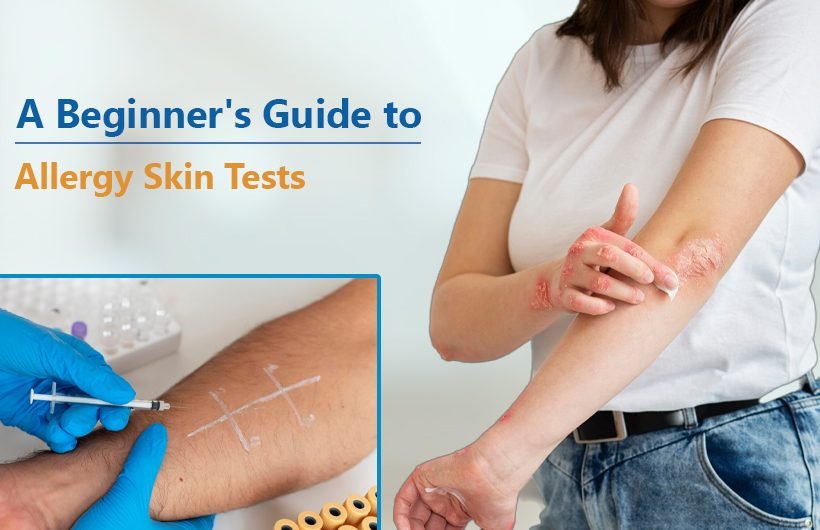Are you frequently dealing with sneezing, itching, or mysterious rashes? These could be signs of an allergic reaction. We must understand the factors behind these signs, and one way to identify allergies is through skin tests. Don’t worry, Dr. Rushi Desai, an experienced pulmonologist and allergy specialist in Ahmedabad, is here to help. Now it’s time to explain what allergy skin tests are, how it works, and how it is significant.
What are Allergy Skin Tests?
Allergy skin tests are diagnostic methods that are applied to ascertain particular allergies that cause allergic reactions in people. That type of test entails applying different allergens on the skin and noting the response of the skin. The possible allergens employed may be pollen, pet dander, foods, and insect stings, amongst others.
What Use Do Allergic Skin Tests Have?
In this case, determining the specific allergen triggering the reaction is crucial for allergy treatment. Allergy skin tests help in:
- Accurate Diagnosis: Identifying the particular allergens that may be triggering your signs and symptoms.
- Targeted Treatment: Enabling the providers to come up with a clear strategy that helps in the process of healing.
- Preventive Measures: Help you avoid known allergens and improve how you manage your environment.
Kinds of Allergy Skin Tests
There are three main types of allergy skin tests:
1. Skin Prick Test (SPT): This is the most frequently used type and implies the introduction to the skin’s surface of minuscule quantities of the allergens.
2. Intradermal Test: Refers to the process of putting a small quantity of an allergen in a person’s skin.
3. Patch Test: Allergens are spotted on patches after which the patches are fixed on the skin so that they can be monitored for 48 hours to pick delayed reactions.
How to Prepare for an Allergy Skin Test
Before undergoing an allergy skin test, certain preparations are necessary to ensure accurate results. Here are some steps to follow:
1. Consultation: For an accurate assessment and diagnosis of the symptoms and medical history, people should book an appointment with Dr. Rushi Desai, eminent pulmonologist Ahmedabad
2. Medication Review: You should also let the doctor know of any medication you are on since some can affect the results of the tests that will be conducted on you. Your doctor will tell you to avoid antihistamines, some types of antidepressants, and some medications for heartburn about 3 days prior to the test.
3. Skin Care: It is advisable that one does not apply any form of lotion or cream on to his or her skin on the day of the test.
The Allergy Skin Test Procedure
Knowing the procedure is always helpful in cases where one may be anxious about the kind of test that is to be conducted. Here’s what to expect:
1. Skin Prick Test:
– Preparation: Your skin usually either on the forearm or back will be cleaned.
– Application: That is, allergens are first spotted in tiny droplets on the skin, and then with the help of a very fine needle – a sterility and sharp end.
– Observation: The test site is observed for about 15-20 minutes in order to check for some reaction such as erythema or oedema.
2. Intradermal Test:
- Injection: A very subtle amount of allergen is introduced into the skin via the subcutaneous layer.
- Observation: Reactions at the test site are watched for about 15-20 minutes of the test.
3. Patch Test:
- Application: Place the antigens on patches and stick them to the back part of your body with sticky tapes.
- Observation: The patches stay on the skin for 48 hours, after which you can observe the reaction to the tests on the skin.
Living with Allergies: Tips and Advice
Thus, the management of allergies can work far about the increment of the quality of life. Here are some tips to help you cope
- Environmental Control: If you frequently expose yourself to allergens in your home, cleanse your air, wash your home often, and reduce dust and mold production to minimize them.
- Allergy-Proof Bedding: You should also use allergen-proof mattresses and pillows, as they are highly recommendable.
- Pets: You should bathe and brush your pets frequently. If residents are allergic to pet dander, avoid letting pets play on carpets or furniture.
– Medication Adherence: Obey what your Pulmonologist Ahmedabad doctor tells you to do and follow his prescriptions by having with you the medications that he prescribed to you or foods and others that cause you severe allergic reactions.
When to See an Allergy Specialist in Ahmedabad
If only you have some sort of constant allergy indications, then it will be advisable that you continue to consult a specialist. Dr. Rushi Desai is among the leading lung specialists in Ahmedabad and aims at his patients to adopt the right measures regarding their allergies. Therefore, with competence, he will be able to ease you and make your health so much better.
Conclusion
Skin tests are vital procedures in the identification of allergies and in handling the discovered allergies.
Sometimes, even the best pulmonologist in Ahmedabad may not be able to do much about allergies. However, with Dr. Rushi Desai’s expertise, you can identify the allergens affecting you and learn how to minimize their impact. Being allergic doesn’t mean you can’t live a healthier life—take the first step today by consulting a professional. To schedule an appointment with Dr. Rushi Desai, visit his clinic in Ahmedabad.






